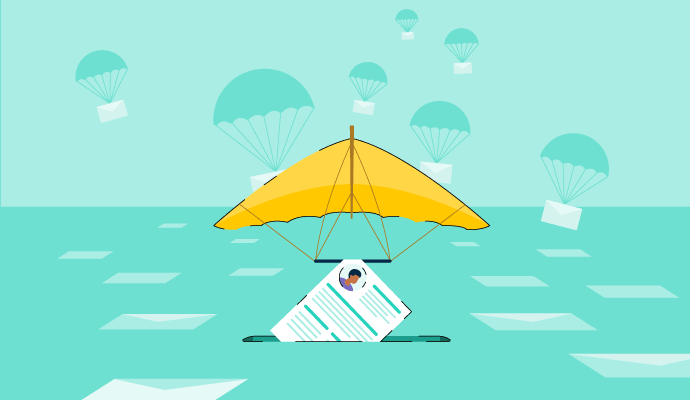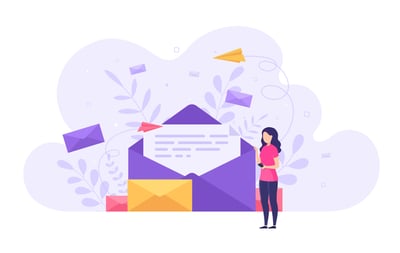No matter which scenario you’re in, applying cold, following up, or leveraging a referral, the goal of every recruiter email is the same: park a conversation that leads to mutual interest or next steps.

If you're like me, your anxiety spikes every time you hit "send" on an email, especially during a job search
That small click can feel like launching a message into a black hole of judgment. Now add the pressure of possibly emailing the wrong recruiter, sending a half-baked draft, or just sounding flat-out awkward, and you've got the perfect recipe for self-doubt.
The good news? Recruiters aren’t out to get you. In fact, they're often looking for the right email, which saves them time, builds rapport quickly, and makes their job easier. But with many companies using staffing software and email management tools to prioritize candidate outreach and hiring funnel progress, your message is just one of many in a sea of inbox noise.
That means your email has to do more than "say hi." It has to say: I'm thoughtful, I’ve done my research, and I might just be the person you’ve been looking for.
Small checks like these can improve your response potential from recruiters and place you in their hiring pipeline.
Personalizing your email, mentioning their name, the company, or a specific role, shows effort and increases your response rate.
The following parameters should be kept in mind before starting to create an effective recruiter email template.
Recruiters are often stretched between many duties and typically have little time to review each applicant, even with resume parsing or recruitment marketing tools. It's usually difficult for them to edge out time for a "quick chat", so the more information you can provide in the least amount of time is ideal.
Respect your recruiter’s time. A focused email with a clear intent (75–100 words) stands out more than a long-winded background story. Lead with value, for example: “I’m a UX designer with 3 years of experience in fintech, and I noticed your team is hiring for a similar role. As it is difficult for them to adhere to emails all at once, this separates you from the crowd and makes your recruiter email more eye-catching.”
There's almost nothing more annoying than selfish requests that only benefit you. Avoid self-serving asks like “What roles are available?” or “Can you help me find a job?” These questions waste the recruiter's time and can be answered on the company's career page or job listings. Do your homework on job listings first. Better ask: “Is the [Role Name] position still open, and would you suggest applying directly or through a referral?
Explore the job description properly before emailing the hiring manager or recruiter. Reaching out to a recruiter is a valid way to learn about the company culture, make connections, or ask for feedback on your application materials.
Remember that you're the one interested in a job opportunity. A recruiter's opinion of you as a candidate and person can mean all the difference in a job offer.
Professional kindness still wins. Show humility and authenticity, and skip overused templates. Recruiters want to work with real humans, not copy-paste machines. Cutting and pasting online templates for job roles or cover letters can only get you so far.
You can use something like, “Hi [Name], hope your week’s going well. Thanks in advance for your time." Staying respectful with your tone and requests shows that you're likely a pleasant and experienced person to work with.
You should wait to write your email, expecting to receive a job offer. Start with an introduction and a small request. If the conversation has small, actionable requests that don’t require a major time investment, it gets easy for the recruiter to take the next quick steps to speed up the process.
For example, instead of asking, “Is this role based in-office or remote?”, say something like, “Would now be a good time to apply?" Start with simple "yes or no" questions that a recruiter can answer as quickly and efficiently as possible, rather than questions that elicit a lengthy response. You can dive into more profound questions and requests as the conversation develops.
At some point during the email process, you realize the job isn't the right fit. Don’t hinge your entire job hunt on one email. Present yourself as an interested but confident professional, not someone putting all their hopes in a single opportunity. Don't come across as too desperate or as if you're dedicating all your job hunt efforts to one company.
By making it seem like you have other options (even if you don't), you're setting yourself up for a stronger position to negotiate from down the road. You can use smart liners like “I’m currently exploring a few roles in [industry], and this one especially stood out.
When many applicants contend for new opportunities, the probability of getting selected reduces considerably. Recruiters are often on the lookout for talented and unique crowd differentiators, and they leave no stone unturned to ensure that.
These email samples cover all the situations you might encounter in your job hunt. Use them as inspiration in the future, but remember to customize your emails based on the nature of the job role.
When writing an email to a recruiter about a job opening, be specific about the role, highlight your relevance in the first few lines, and include a clear, low-friction ask, like confirming whether the position is still open.
Dear [Mr./Ms.] [Recruiter’s Last Name],
Subject: Interest in [Job Title] Role at [Company Name]
I recently came across the [Job Title] opening at [Company Name] and wanted to express my interest directly. With [X] years of experience in [Your Field] and a strong background in [relevant skill or project], I believe my profile aligns well with your team's goals.
I’ve attached my resume for reference and would love to know if the role is still open or if there's someone on the team you’d recommend I connect with. Thanks in advance for your time. I’m excited about the prospect of contributing to [Company Name].
Best regards,
[Your Full Name]
[Phone Number] | [LinkedIn Profile] | [Portfolio URL]
If a recruiter hasn’t responded after your initial outreach or application, follow up politely after 5–7 business days. Keep the tone friendly, restate your interest clearly, and make it easy for them to reply without pressure.
Dear [Mr./Ms.] [Recruiter’s Last Name],
Subject: Following Up on [Job Title] Application – [Your Name]
I hope you’re doing well. I wanted to follow up on my previous message regarding the [Job Title] opening at [Company Name]. I remain very interested in the position, as it aligns closely with my background in [your field or expertise].
If the role is still open, I’d appreciate any updates or next steps to consider. I’ve reattached my resume below in case it's helpful. Thanks again for your time and consideration!
Warm regards,
[Your Name]
[Phone Number] | [LinkedIn Profile] | [Resume Attached]
A referral instantly boosts your credibility, so lead with it right away. Mention the referrer by name, reference the specific role, and briefly explain why you're a strong match. Keep it warm, confident, and direct.
Dear [Mr./Ms.] [Recruiter’s Last Name],
Subject: Referred by [Referrer Name] – [Job Title] Interest
I was recently referred to you by [Referrer’s Full Name], who suggested I reach out regarding the [Job Title] opening at [Company Name]. With [X] years in [Your Field] and a focus on [Key Skill or Achievement], I believe I’d be a great fit for the role and team.
I’ve attached my resume and LinkedIn profile below. Please let me know if the position is still open or if you’d recommend any next steps. I’d appreciate the opportunity to speak further.
Best,
[Your Name]
[Phone Number] | [LinkedIn Profile] | [Resume Attached]
No matter which scenario you’re in, applying cold, following up, or leveraging a referral, the goal of every recruiter email is the same: park a conversation that leads to mutual interest or next steps.
If a recruiter emails you out of the blue — or about a job that’s not quite right — you’ll want to respond strategically. The key? Be prompt, polite, and clear about your goals. Below are improved recruiter email templates optimized for today’s job search environment.
If you wish to respond to an interview confirmation professionally, you can look at the following template and coordinate professionally.
Dear [Mr./Ms.] [Recruiter’s Last Name],
Subject: Interview Confirmation – [Job Title] at [Company Name]
Thank you for reaching out regarding the [Job Title] opportunity at [Company Name]. I’m excited about this position—it closely aligns with my background in [Field/Industry], particularly my work as a [Current Role or Expertise].
I’d be happy to schedule an interview at your convenience. Please let me know your availability this week, and I’ll coordinate accordingly.
I’ve attached my updated resume and portfolio for review.
Best regards,
[Your Full Name]
[LinkedIn Profile] | [Phone Number]
This is the template you can use if your recruiter’s offer isn’t aligned with your goals, but you’re still interested in working with the company.
Dear [Mr. or Mrs.] [Recruiter name],
Subject: Reconsideration for [Preferred Role] at [Company Name]
Thank you for reaching out regarding the [Offered Role] at [Company Name]. I appreciate the opportunity and your consideration.
While this particular role doesn’t match my current skill set and career goals, I would love to be considered for a future opportunity more aligned with [Preferred Role/Department]. My background in [Industry/Expertise] has given me deep experience with [Relevant Skills], which I believe could bring strong value to your team.
I’ve attached my resume for future reference and would be grateful if you kept me in mind for [Specific Role] openings.
Warmly,
[Your Name]
[LinkedIn] | [Portfolio URL]
Choosing the right subject line isn’t just about clarity; it’s about immediate relevance. Here are recruiter email subject lines grouped by intent, with guidance on when and why to use them.
If you’re reaching out cold, use the exact job title as posted. If replying, mirror the recruiter’s subject line and add value; don’t overwrite it completely.
Timing is everything when it comes to follow-up. Here’s a streamlined timeline for when to email a recruiter again based on your interaction history:
| Trigger event | Wait before following up | Sample follow-up cue |
| Sent job application | 5–7 business days | Hi [Name], just checking in on my application for [Job Title], would love to know if the role is still open. |
| Completed a recruiter interview | 2–3 business days | Thank you again for your time. Just wanted to reconnect on the next steps for the [Job Title] role. |
| No response to initial cold email | 7 days | Circling back in case my previous message got buried, still very interested in [Role] at [Company] |
| Got a role mismatch email | Same day or 1-day delay | Thanks for the opportunity, I'd love to be considered for [Alternative Role] instead |
One simple rule of thumb here is that one initial follow-up + one reminder is acceptable. Beyond that, it risks being perceived as pushy.
Not every moment is the right moment, but many signals tell you when it’s smart to reach out. Whether you’re job-hunting actively or responding to a recruiter’s email, timing, context, and tone make all the difference.
Use this table to quickly decide when and how to email a recruiter based on the situation.
| Trigger condition | Action to take | Recommended timing |
| You found a job you are excited about | Email the recruiter to express interest and ask about next steps | Within 24-28 hours of seeing the listing |
| A recruiter reached out to you | Respond with enthusiasm and availability | Within 24 hours |
| You submitted an application, but haven't heard back | Send a polite update to check the status | 5-7 business days after application |
| You completed an interview and are awaiting the next steps. | Follow up with a thank you and a timeline inquiry | 2-3 business days post the interview |
| A friend referred you to a recruiter | Email a warm intro mentioning the referral | Within 1-2 days of the referral |
| You were previously in touch with the recruiter | Reconnect if a relevant role opens up | when the new opportunity is live or relevant |
| You are unsure about the right contact or channel | Ask if they are the correct point of contact for a specific role | As soon as confusion arises |
Even a well-written email can fall flat if the timing’s off. Be intentional, stay respectful, and let signals guide your outreach, not stress.
Recruiters rely on staffing software that automatically parses, tracks, and responds to candidate emails, making robust email integration a must-have for your team. Based on G2’s Summer 2025 Grid® Report, these five platforms lead the pack in email-enabled recruiting performance and user satisfaction:
These are the top 5 staffing software as per G2's Summer 2025 Grid Report
Start with a personalized greeting, followed by a short introduction that states your intent (e.g., job interest, referral, or follow-up). Include a sentence or two explaining why you’re a strong fit, then add light touch question, like confirming if the role is open or suggesting a quick chat. End with a professional sign-off and your contact details..
A good subject line should be specific, clear, and role-focused. Examples include: Application for [Job Title] – [Your Name] Referred by [Contact Name] – [Job Title] Interest Follow-Up on [Job Title] Application (Avoid vague lines like “Job inquiry” or “Resume attached.”)
If you’ve sent an application or initial outreach, wait 5–7 business days before following up. After an interview or recruiter conversation, 2–3 business days is appropriate. If there’s no response after a second follow-up, it’s best to move on respectfully.
Yes, attach your resume as a PDF and include a link to your LinkedIn profile or portfolio in the email signature. This gives the recruiter multiple ways to quickly review your experience without digging through attachments or asking for more information.
If you are a job applicant who is neck deep into a job search, writing cold recruiter emails sends off a pretty professional impact to the recruiter. Not only is a recruiter, across any domain, vetting resumes for hiring experts, but also candidates who can maintain a professional demeanor and possess great communication skills.
If you are unsure of where to start from, these handy recruiter email templates can be your foundation. But while you use them, put your own creative spin and customize these templates to make it yours and seize the potential employment opportunity.
Need help drafting that recruiter message? Explore the best AI writing tools to get your tone, structure, and personalization just right.
This article was originally published in 2020. It has been updated with new information.
Derek is a former G2 content associate. He can usually be found discussing pop music, politics, or digital marketing on the internet. (he/him/his)
There are many ways you can stand out from the crowd.
 by Mara Calvello
by Mara Calvello
No one likes being snooped on.
 by Mara Calvello
by Mara Calvello
Keeping a tidy inbox is no small feat.
 by Maddie Rehayem
by Maddie Rehayem
There are many ways you can stand out from the crowd.
 by Mara Calvello
by Mara Calvello
No one likes being snooped on.
 by Mara Calvello
by Mara Calvello


